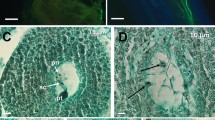Abstract
A study was conducted into the course of meiosis in F1 interspecific hybrids of Lycopersicum esculentum Mill (mutant line Mo 638) × Lycopersicum chinense Dul. and its parental forms. An F1 interspecific hybrid was obtained through the embryo culture technique. A decrease in the chiasma frequency and an increase in the frequency of univalents and meiotic abnormalities compared to their parental forms were detected in hybrid plants. The number of univalents and the percentage of main impairments decreased, as the height of bud tier locations increased. A conclusion was made regarding the connection between the regularity of meiosis in the examined F1 interspecific hybrids of Lycopersicon esculentum × Lycopersicon chilense, on the one hand, and the hybrid nature of genotypes and the influence of environmental factors, on the other hand.
Similar content being viewed by others
References
Zhuchenko, A.A., Adaptivnaya sistema selektsii rastenii (ekologo-geneticheskie osnovy) (The Adaptive System of Plant Breeding (Ecological and Genetic Basis)), Moscow, 2001, vol. 2.
Zhuchenko, A.A., Glushchenko, E.Ya., Andryushchenko, V.K., Balashova, N.N., Samovol, A.P., and Medvedev, V.V., Dikie vidy i polukul’turnye raznovidnosti tomatov i ikh ispol’zovanie v selektsii (Wild Species and Half-Cultured Varieties of Tomatoes and Their Use in Breeding), Chisinau: Kartya Moddovenyaske, 1974.
Fernandes-Munoz, R., Gonzales-Fernandes, J.J., and Cuarteo, J., Variability of Pollen Tolerance to Low Temperatures in Tomato and Related Wild Species, J. Hort. Sci., 1995, no. 70, pp. 41–49.
Grati, M.I. and Grati, V.G., Prospects of Using Remote Hybridization in Tomato Breeding, Ovochivnitstvo i Bashtannitstvo, 2005.
Rick, C.M., Differential Zygotic Lethality in a Tomato Species Hybrid, Genetics, 1963, vol. 48, pp. 1497–1507.
Giddings, G.D. and Rees, H., A Detail Analysis of Chromosome Pairing at Meiosis in Pollen Mother Cells of Somatic Hybrid Lycopersicon esculentum and Lycopersicon peruvianum, Proc. Roy. Soc. London, 1992, vol. 248, no. 1323, pp. 255–259.
Picó, B., Herraiz, J., and Nuez, F., Lycopersicon chilense Derived Bridge Lines for Introgressing L. peruvianum Traits into the Esculentum Genome, Rep. Tomato Genet. Coop., 2000, no. 50, pp. 30–33.
Boos, G.V., Badina, G.V., and Burenin, V.M., Geterozis ovoshchnykh kul’tur (Heterosis of Vegetable Crops), Moscow: Agropromizdat, 1990.
Kondratenko, S.I., Montvid, P.Yu., Samovol, O.P., and Miroshnichenko, V.P., Using the in vitro Culture Method for Growing Immature Hybrid Embryos of Incompatible Tomato Species, Ovochivnitstvo i Bashtannitstvo, 2005, vol. 51, pp. 381–396.
Takashina, T., Imanishi, S., and Egashira, H., Evaluation of the Cross-Incompatibility of “peruvianum-Complex” Lines with Lycopersicon esculentum Mill, by the Ovule-Selection Method, Breed. Sci., 1997, no. 47, pp. 33–37.
Zhuchenko, A.A., Grati, V.G., Andryushchenko, V.K., and Grati, M.I., Induction of Chromosome Aberrations and the Localization of Genes Controlling Several Economically Valuable Traits in the Genome of Tomato, Izv. Akad. Nauk Mold. SSR, Ser. Biol. Khim. Nauk, 1980, no. 4, pp. 24–30.
Orlov, A.I., Prikladnaya statistika (Applied Statistics), Moscow: Ekzamen, 2004.
Lakin, G.F., Biometriya (Biometrics), Moscow: Vysshaya Shkola, 1990.
Molhar-Lang, M., Galiba, G., Kovacs, G., and Sutka, I., Changes in the Fertility, Mesotic Behaviour of Barley (Hordeum vulgare), × Wheat (Triiicum aestivum) Hybrids Generated from Tissue Cultures, Genome, 1991, vol. 34, no. 2, pp. 261–266.
Zhuchenko, A.A., Genetika tomatov (Genetics of Tomatoes), Chisinau: Shtiintsa, 1973.
Loidl, J., Effects of Elevated Temperature on Meiotic Chromosome Sinapsis in Allium ursinum, Chromosoma, 1988, no. 6, pp. 449–458.
Smirnov, B.M., Cytogenetika (Cytogenetics), Moscow: Nauka, 1991.
Tang Ri-Sheng, Zheng Jian-Chu, Jin Zhi-Qing, Zhang Da-Dong, Huang Ti-Hong, and Chen Liu-Gen, Possible Correlation between High Temperature-Induced Floret Sterility and Endogenous Levels of IAA, GAs and ABA in Rice (Oryza saliva L.), Plant Growth Regulat., 2008, vol. 54, no. 1, pp. 37–43.
Peet Mary, M., Willits, D.H., and Gardner, R., Response of Ovule Development and Post-Pollen Production Processes in Male-Sterile Tomatoes to Chronic, Sub-Acute High Temperature Stress, J. Exp. Bot., 1997, vol. 48, no. 1, pp. 101–111.
Ludilov, V.A., Method to Increase the Fertility of Interspecific Hybrids of Eggplant, S.-Kh. Biol., 1974, vol. 9, no. 6, pp. 32–34.
Montvid, P.Yu., Compensatory Distribution of Chiasms within the Reproductive System of F1 Hybrids of Solanum melongena L., Visn. Kharkiv. Nats. Agrar. Univ., Ser. Biol., 2006, no. 2, pp. 61–65.
Author information
Authors and Affiliations
Corresponding author
Additional information
Original Ukrainian Text © P.Yu. Montvid, O.P. Samovol, V.P. Miroshnichenko, 2011, published in Tsitologiya i Genetika, 2011, Vol. 45, No. 2, pp. 16–21.
About this article
Cite this article
Montvid, P.Y., Samovol, O.P. & Miroshnichenko, V.P. Course of meiosis in F1 interspecific hybrids of Lycopersicon esculentum Mill. × Licopersicon chilense Dun.. Cytol. Genet. 45, 75–79 (2011). https://doi.org/10.3103/S0095452711020095
Received:
Published:
Issue Date:
DOI: https://doi.org/10.3103/S0095452711020095




